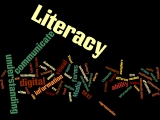It’s an interesting question, and beyond all the articles, videos, and even beyond our classrooms we teach I think the obvious answer is, yes. But I’m assuming learning takes place outside as well as inside the classroom. The generations beyond mine are learning in radically different ways than ever before. More and more schools are revamping their curriculums to develop 21st century skills into their subject. The fact we had to review the 21st century skills framework tells me learning is changing with technology. Another example would be the 2012 Teacher of the Year, Mr. Stumpenhorst. Here is a teacher who has used technology to collaborate with other teachers and their classrooms from all over the world. Students now more than ever can learn multiple disciplines during a class while using technology. For example, students in Mr. Stumpenhorst’s social studies classroom are learning the subject along with computer typing and research skills while also learning about different cultures from their work with the other classes. What I continue to think about during this week is the learning that is taking place beyond the educational classrooms. How many of us now are talking with friends and bring up a topic no one is sure about only for someone to pull out their iphone and right then and there to research the answer? Answers to questions are no longer painstaking to find. Learning now has, or is going to be, more about what can we do with all the knowledge that is now at our finger tips.
Friday, February 24, 2012
Sunday, February 19, 2012
Digital Citizenship - my week 5.
This week I focused on the importance of digital citizenship in our schools. Here is my report, I hope you enjoy it and maybe find somethings useful.
Digital Citizenship Initiative for Riverside School will be presented to our school staff and colleagues. Riverside is an Intermediate School with two grades, 5th and 6th. Digital citizenship should be a major priority at this age because these are the students that are starting to explore how technology can influence both their academic and social lives. My plan is simply to build a curriculum based on these three main ideas: understanding the technology, safe communication online, and netiquette: responsible usage of technology.
Digital Citizenship - The concept that users should know how to use technology
appropriately. Digital Citizenship is more than just a teaching tool; it is a way to prepare students/technology users for a society full of technology. – Using Technology appropriately
The issue with digital citizenship in our schools is that our teaching is a decade behind the technology. Our schools need to spend some time educating our students that the internet is not some new aged wild west where anything they say or do goes. Students need to understand anything they say can hurt others and even potentially themselves. Pictures or videos they post can come with big consequences. Lastly, they need to know just because they might be in the comfort of their family and friends’ homes the internet can still be very dangerous.
While there are a lot of websites that bring good educational information right to your fingertips here are several websites that are great on how to best navigate the internet wisely:
Netsmartz opens up with information to parents but there is much more for educators, teens, and even law enforcement. Along with my slideshow presentation these are a few of the websites that I would use to showcase the importance of digital citizenship. I leave thinking of the great quote from the Spiderman comics - “With great power comes great responsibility.” The internet has great power indeed and we as teachers need to educate our students that they need to use it carefully.
My Sliderocket.
My Sliderocket.
Subscribe to:
Comments (Atom)
